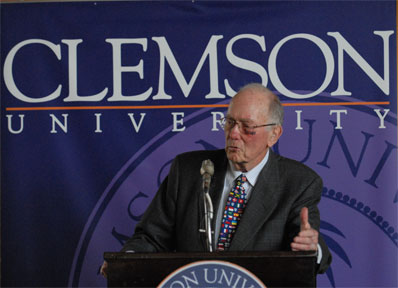Townes Education and Outreach Programs

Charles H. Townes
The late Charles Townes was most well known for his research that led to the development of the laser. He received the Nobel Prize for Physics in 1964 for his research on the maser (microwave amplification by stimulation emission of radiation), which led to the invention of the laser, one of the most significant scientific discoveries of the 20th Century. Lasers are used in nearly all aspects of life today, including fiberoptics communications, laser processing in the manufacture of automobiles and many other commercial products, ophthalmology, medicine, defense and space applications.
Townes received numerous accolades over the years, and Clemson is proud to note it was among the first to acknowledge his contributions to science by awarding him an honorary degree in 1963. He continued an informal connection with the University over the years. In February 2000 he delivered the Godfrey Distinguished Lectures in Astrophysics, and two Clemson faculty members, Vice President for Research and Economic Development Chris Przirembel and Caron St. John, director of the Arthur M. Spiro Institute for Entrepreneurial Leadership, received the Charles H. Townes Individual Achievement Award from InnoVision, an Upstate South Carolina organization that promotes excellence and leadership in technology.
The Townes Laboratories complement the 2005 creation of the Townes Fellows program, a joint effort by Clemson and Townes’ alma mater, Furman University, to bring Furman undergraduates to Clemson to conduct optics research with COMSET. This premier program is comprised of research and educational initiatives centered on optical sciences and engineering.
COMSET Director John Ballato spearheaded the move to name the laboratories for Townes. “Dr. Townes has spent his distinguished career committed to educating future generations. We are deeply grateful that his name will be associated with our program as a daily reminder of what has been and can be achieved. Dr. Townes was the first to remind students that they too possess the ability to make the next great discovery,” he said.
- Read Charles H. Townes' Commencement Address, June 1, 1963 entitled: The Next Fifty Years


